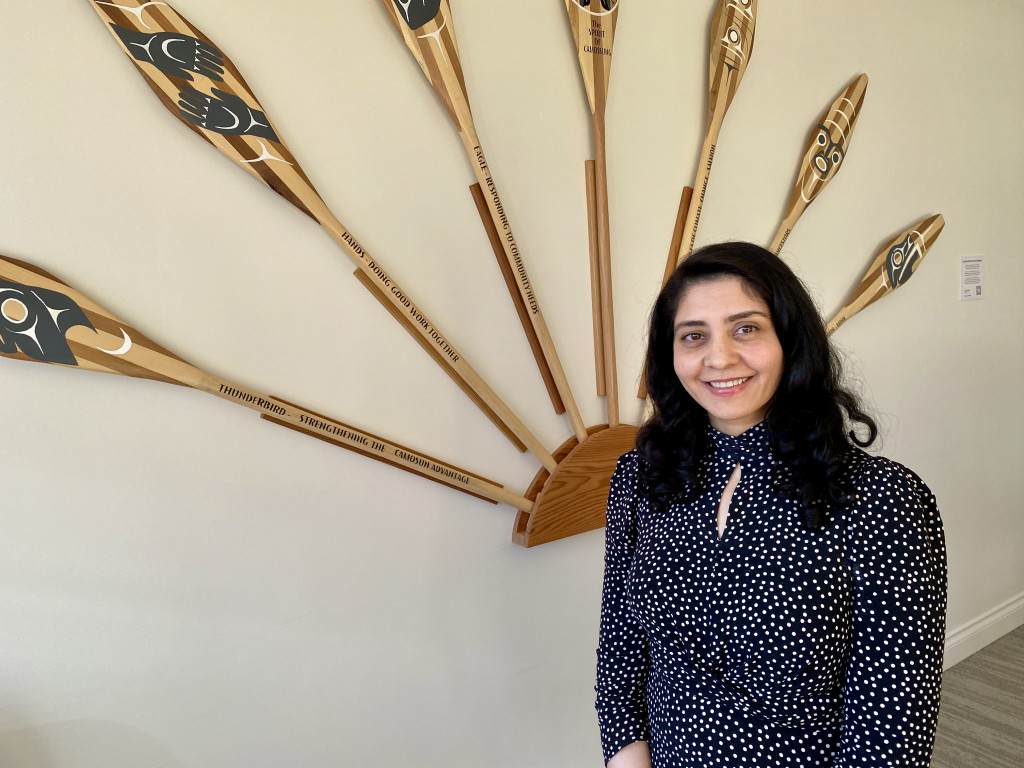Camosun College honours International Women’s Day 2024 with a profile of Tehmina Khwaja, the college’s new Director of Equity, Diversity and Inclusion. She aims to dismantle barriers with a unique brand of gentle and kind leadership.

Tehmina Khwaja stands with the six paddles of the Strategic Plan 2023-2028 on Lansdowne campus.
Equity, diversity, inclusion and social justice are embedded in the culture of Camosun College through the Strategic Plan 2023-2028. As one of the six paddles representing the college’s priorities, upholding these values fosters “a barrier-free and respectful learning and working environment for students and employees.” These values need a steward, someone to steer the culture and ensure that all voices are heard and included.
The college has created a new position, Director of Equity, Diversity and Inclusion, and Tehmina Khwaja is the right woman for the job. She started in February 2024.
“It’s very evident that people at Camosun care about equity, diversity and inclusion [EDI] and have been doing amazing work off the side of their desks for a long time,” says Tehmina. “But there’s a need to consolidate and streamline initiatives. My priority as I begin this position is to find synergies among different groups doing the work and strategically plan for EDI at Camosun. It’s an opportunity to build relationships and collaboratively form a holistic picture of what EDI needs to be at the college.”
Equity and leadership in post-secondary institutions
Tehmina points out that there is a prevailing misconception that women have achieved equity, especially in a post-secondary environment where women students, employees and educators outnumber men at most campuses. She encourages looking closely at this assumption. “What are those disciplines where we see more women? They are the ‘feminized’ disciplines, such as nursing, education, the humanities. These are also often disciplines that lead to jobs with lower salaries. Women are also concentrated in the underpaid and precarious administrative and academic positions – service areas, assistants, sessional instructors. If you go up in the hierarchy, it’s still mostly dominated by white men.”
In leadership positions within post-secondary institutions and many other sectors, Tehmina notes that there are fewer racialized people, Indigenous people, people who identify as 2SLGBTQIA+, and very few persons with disabilities. Women have identities that intersect with all of these other ways of being.
“When we consider intersectionality, we see even fewer women occupying leadership positions. It’s a problem that needs to be addressed. We also need to ensure the safety and rights of trans women on an urgent basis.”
Working together to create change for everyone
As a woman who grew up in the conservative society of Pakistan, Tehmina is acutely aware of the limitations that women experience and how women can work together to overcome them. “I’ve seen massive changes that occurred when women came together and demanded better treatment, more autonomy, and greater participation. Since coming to Canada, I’ve been so impressed with what Canadian women have achieved and continue to advocate for. I believe in the power of coming together and using our voices to advocate for people who are denied equity.”
Tehmina also notes that women make huge contributions to society, beyond fighting for their own and other marginalized folks’ inclusion and equality. “I think that women actually hold society together. The work that women end up doing – by choice or otherwise – is referred to as ‘glue work’ in feminist scholarly circles because it literally holds things together. This care-oriented work makes it possible for organizations and society to function.”
Strength in gentleness and kindness
The first woman to model this essential work for Tehmina was her mother, who was her main inspiration when she was growing up. She looks to her mother as a great example of a woman with exceptional leadership qualities, and who led by serving.
“I didn’t even know that there was a name for this – ‘servant leadership.’ Things would just fall apart whenever she had to be away for a while. It was amazing to me how she led us in a way that was gentle and kind. I learned from her that there is strength in gentleness and in kindness. Many people think that these traits aren’t in alignment with good leadership, but they are.”
Tehmina is influenced by her mother’s way of gentle leadership and brings this into her ongoing work for inclusion. She also encourages women to be gentle with themselves, especially in the face of systemic barriers.
“My advice for women is to remember that the structures we’re working in were not created for us. If you encounter a systemic barrier, it’s not you that is the problem – it’s the system. The structures within our system were not created with us or our needs in mind. Don’t blame yourself; the barriers were intentionally put in place to keep women and other marginalized people out. EDI work is all about identifying and removing these barriers.”
Contact information
Roseanne Harvey
Camosun College
